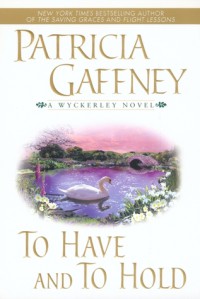20437
Followers
21
Following
Alexis Hall
AJH diligently fails to get to grips with yet more social media.
Boy Meets Boy
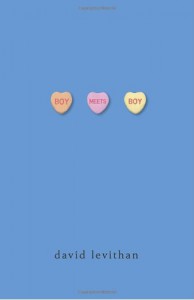 This book is ridiculously important to me. I friend of mine gave from university gave it to me, back when we were both messed up 18 year olds with no clue who we were, what we wanted or how to get it. "You have to read this!" he said. And I know it's about teenagers, really, not young men who were supposed to be adults. But it was the first time, really, we'd ever read something that was just about two boys falling in love, where it wasn't angsty, hostile or doomed to death and failure.
This book is ridiculously important to me. I friend of mine gave from university gave it to me, back when we were both messed up 18 year olds with no clue who we were, what we wanted or how to get it. "You have to read this!" he said. And I know it's about teenagers, really, not young men who were supposed to be adults. But it was the first time, really, we'd ever read something that was just about two boys falling in love, where it wasn't angsty, hostile or doomed to death and failure.So I'm in no position to judge whether this is actually, objectively, any good. It's charming, insubstantial and kind of delightful. Although it's mundane to a fault - it really is just about two boys falling in love, one boy nearly messing it up, and one boy sorting it out again - it's essentially set in a semi-utopian post-homophobia bubble. The Homecoming Queen and the star quarterback, for example, are the same person - a fabulous drag-queen called Infinite Darlene, who naturally finds life a bit difficult sometimes:
Infinite Darlene doesn't have it easy. Being both star quarterback and homecoming queen has its conflicts. And sometimes it's hard for her to fit in. The other drag queens in our school rarely sit with her at lunch; they say she doesn't take good enough care of her nails and that she looks a little too buff in a tank top. The football players are a little more accepting, although there was a spot of trouble last year when Chuck, the second-string quarterback fell in love with her and got depressed when she said he wasn't her type.
Hee!
Ash
 This is a lesbian Cinderella re-telling. 'Nough said, right?
This is a lesbian Cinderella re-telling. 'Nough said, right?Actually, it's probably not what you think. It's a strangely cold and bleak book in many ways. Ash spends pretty much the entire thing lost in her grief at the death of her father, deeply depressed and basically suicidal. Her Fairy Godmother is actually a twisted faerie lord called Sidhean who sort of falls for her, and her handsome Prince is the Prince's Huntress, Kaisa. Essentially magic represents a form of self-destruction, love both reality and salvation, though it is a choice Ash must make for herself.
It's not really a story about being gay as such; it's just a story about falling love. I liked that.
Fallen
 Okay, I'll be completely honest: I bought this primarily for the cover. Who can resist a goth in a frock? I genuinely thought it was going to be some sort of sub-Twilight bilge but it turned out to be totally metal. I've read the whole series and I kind of think the first book is the strongest - I think because the setting is so, let me repeat myself, total metal I genuinely had no idea where it was going. And when it settled down into a typical teen romance across time, space, death and reality, I was - not disappointed per se, but I lost the OMG factor.
Okay, I'll be completely honest: I bought this primarily for the cover. Who can resist a goth in a frock? I genuinely thought it was going to be some sort of sub-Twilight bilge but it turned out to be totally metal. I've read the whole series and I kind of think the first book is the strongest - I think because the setting is so, let me repeat myself, total metal I genuinely had no idea where it was going. And when it settled down into a typical teen romance across time, space, death and reality, I was - not disappointed per se, but I lost the OMG factor. The first book, at least, is set in a ... well ... nope I can't think of a better way to describe it ... totally metal reform school called Sword and Cross. Our heroine, Luce, has been sent there after the mysterious fire-related death of her boyfriend. She is generally harassed by dark shadows, befriended by charming eccentrics and pursued by hot guys - the slightly wankerish Daniel and the totally-up-for-it Cam. Guess which she winds up with? SIIIGH.
So is the fallen angel branch of the supernatural boyfriend bureau but the novel seems quite aware just how much being trapped in an immortal lovestory might fuck up your life. Even if it's, like, totes romance. Luce is great, the backstory is cracktastic, the atmosphere is suitably gothic and the book is smart, well-paced and ... uh ... totally metal.
Incarceron
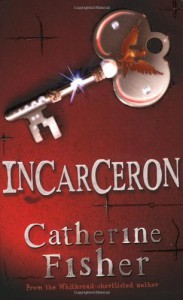 This is fucking cracktastic and I love it. It's part 1 of a duology (hurrah for fantasy not being at trilogy), the follow-up being Sapphique, and although it kind of leaves you hanging it's still a fairly effective emotional arc.
This is fucking cracktastic and I love it. It's part 1 of a duology (hurrah for fantasy not being at trilogy), the follow-up being Sapphique, and although it kind of leaves you hanging it's still a fairly effective emotional arc.So the premise is this: Incarceron, right, is a sentient prison. How awesome is that? About 150 years before the book begins, all the social undesirables and criminals were dumped in there, and the prison was supposed to provide a paradise for them and help guide them towards enlightenment. But, of course, it all goes horribly wrong (who came up with that plan, anyway, had they never read a single piece of sci-fi?) and the prison has, instead, created a hell from which nobody can escape. Outside Incarceron, society has stagnated into a sort of rigidly imposed faux 18th century called 'The Era'.
Again, we have two parallel plots that don't so much come together as weave in and out of each other: Finn is a prisoner who dreams of the outside world, Claudia is the daughter of the prison Warden, trapped in a web of politics, intrigue and arranged marriages.
This is a book with big ideas, complicated characters and a fast-moving plot. It's everything I really love about fantasy with none of the stuff I really hate, and all in about 300 pages breathless pages. I genuinely don't know how the author fit it all in. But there's backstory, actual story, adventure, betrayal, horror, worldbuilding, subtlety, drama, discovery, meditations on censorship, authority and justice ... you name it, it's there.
And the prison itself is terrifying. Terrifying and weirdly heartbreaking. Like its Warden.
Can you even dream how it is to live for ever trapped in your own mind, watching only the creatures that inhabit it? They made me powerful and they made me flawed.
Bitterblue
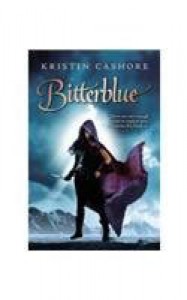 Huh. Interesting one.
Huh. Interesting one.I think I basically ended up admiring this more than I loved it. It does, however, draw together the threads of the previous two books very effectively and continue what seem to be an over-arching themes of the use and abuse of power.
So I feel this is the book it needed to be and I think it's very ambitious in structure and approach and, honestly, the sort of ideas its trying to explore ... but yea, it doesn't entirely come together as a story for me. Especially because the plot revolves around mysteries, large and small, and Bitterblue (for perfectly understandable in character reasons) isn't all that interested in solving them, for about the first two thirds of the book.
The pacing, in general, felt a bit off to me and there seemed to be long stretches of time with no particular progress or focus - which again, sort of makes sense, since Bitterblue is trying to run her kingdom, not be a protagonist. And some of the sub-plots seemed a bit under-baked: for example Bitterblue's romance with Saf seems pretty shallow (although, something I did appreciate was the fact it wasn't the POINT of the book, nor did it ever become Bitterblue's goal). But there's also lots of the usual Cashore's goodness here: sensible and open-minded attitudes to love and romance (Po and Katsa still aren't married, Bitterblue is allowed to have sex and for the sex to be good, without her ending up in a FOREVERMANCE), lots and varied female characters, all with agency and complexity, same-sex couples depicted with care and respect, and a strong commitment with what you might call a feminist-friendly ideology.
If FIRE is, at its heart, a book about (male) gaze and rape culture: then I saw BITTERBLUE as a book about abuse survival. She is, after all, the queen of wounded city. And the 'happy ending' she and her people eventually forge may not be a traditional one-- it may, indeed, be shot through with loss and suffering---but it is ultimately one of healing and acceptance and truth.
Fire
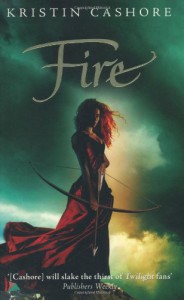 Brought to you courtesy of Book Project 2015.
Brought to you courtesy of Book Project 2015.I cannot even with how good this is. I mean you'd have to have you head under a rock to fail to notice that these books--while being perfectly decent fantasy yarns--are about ... well ... women.
Which makes me feel kind of awkward writing about them.
Not because I believe books written primarily for/about women don't have anything to say to me (because of course they do) but because I'm very aware that I'm reading from the outside. And the things I recognise in these books are things other people to live with.
Both Graceling and Fire deal with power and powerlessness - specifically the ways these intersect with and are influenced by gender. In Graceling, we have the kick-arse heroine who has always had her strength defined and used by the men around her. And in Fire we have the "deadly beauty" - a woman whose loveliness can literally control minds. Essentially both novels take for their protagonists very traditional female-character stereotypes and not only deconstruct them but re-forms them. In Graceling, Katsa learns about her own strength and how being strong does not necessarily mean being without compassion, warmth and companions you can rely on. And Fire, let's face is, is basically about rape culture.
Fire is what's known as a monster - a person (although animals can be monsters too) so astonishingly beautiful that it directly influences the people around her, causing them to lose their senses and become enamored with her. And/or want to hurt her:
She had a dagger scar on one forearm, another on her belly. An arrow gouge from years ago on her back. It was a thing that happened now and then. For every peaceful man, there was a man who wanted to hurt her, even kill her, because she was a gorgeous thing he could not have, or because he'd despised her father. And for every attack that had left a scar there were five or six other attacks she'd managed to stop.
Yes, it's not exactly subtle, but God it's effective. I was moved and also kind of ... illuminated, I suppose. It's one thing to rationally understand the world other people live in but quite another to have it make an emotional impact.
I should also say there's a damn good story here as well -- Cashore's writing seems more polished and her ideas more ambitious. And there's a genuinely lovely romance too.
Graceling
 Nowadays, I tend to look at YA fiction through the slightly hysterical lens of WHAT IS THIS TELLING MY GODDAUGHTER?
Nowadays, I tend to look at YA fiction through the slightly hysterical lens of WHAT IS THIS TELLING MY GODDAUGHTER?I like what this book is telling my goddaughter.
It's telling her that she's powerful and strong, that she lives in a world as much inhabited by women as men, and that she can do whatever she damn well wants. That love and compassion and courage have nothing to do with gender.
It's also telling her she deserves to be loved for exactly who she is.
He laughed “You may hunt for my food and protect me when we’re attacked, if you like. I’ll thank you for it.”
“But I’d never need to protect you, if we were attacked. And I doubt you need me to do your hunting, either.”
“True. But you’re better than I am, Katsa. And it doesn’t humiliate me.” He fed a branch to the fire. “It humbles me. But it doesn’t humiliate me.”
So, we have a brash, bold, emotionally distant heroine and a gentle, more emotionally secure hero. We also have a world bristling with amazing characters, lots of them women, some of them gay.
It's a bit rough round the edges in places. The naming conventions are kind of silly. The writing is functional rather than stunning. And for people who like their fantasy world building done with a trowel, it'll probably seem a flimsy and lacklustre.
But I love this. And I look forward to sharing it with Kathryn when she's a teeny bit older.
Disturbed by Her Song
 Tanith Lee is a writer who has always inspired strong reactions in me. When she hits, she hits it out of the park. And when she misses she bangs you in the face heavily with a bat. There appears to be no middle ground. I’m not sure how best to characterise Disturbed by her Song, as it seems to defy any particular genre classification - some of the stories involve the supernatural, either explicitly or implicitly, and some of them don’t, thought they all have an elusive, tantalising, other-worldly air to them. So let's go with 'queer, surrealistic and semi-fantastical.'
Tanith Lee is a writer who has always inspired strong reactions in me. When she hits, she hits it out of the park. And when she misses she bangs you in the face heavily with a bat. There appears to be no middle ground. I’m not sure how best to characterise Disturbed by her Song, as it seems to defy any particular genre classification - some of the stories involve the supernatural, either explicitly or implicitly, and some of them don’t, thought they all have an elusive, tantalising, other-worldly air to them. So let's go with 'queer, surrealistic and semi-fantastical.'I’m not a big fan of short stories in general, which I know makes me a philistine, but it’s a personal preference thing, not a judgement thing. I like to be able to swim about in a text; short-stories barely dampen the feet. But the transitory, fragmentary feel of Disturbed by her Song contributes to the eerie pleasure of reading the book - one of the few instances when wanting more and not getting it is the right sort of literary gratification.
Moreover, the stories - although they each stand alone - are united and contextualised by their common themes, and the fact that they drift in and out of a fictionalised reality. The collection, which is broken into parts, ‘Youth and Age’, ‘Youth’ and ‘Age’, consists of stories and/or remembrances, ‘written’ by Esther and Judas Garber / Garbah, who are half-siblings. I mean, obviously they’re written by Tanith Lee, writing as Esther and Judas, but it provides an extremely effective meta-text. Esther and Judas have markedly different voices - Judas is distant and somewhat melancholy whereas Esther is frank and more expressive - but remain united by familial connection and experience. Equally the boundary between fiction and ‘reality’ remains vague at best, so, whether as characters, narrators, or writers they remain intriguingly unreliable figures, layering text on text on text, with Lee somewhere at the bottom of it all.
Like most story collections, your mileage may vary on an individual basis, but holistically I found Disturbed by her Song rather dazzling. The truth is, there’s a deep pleasure in reading a text set within a fully queer context. It’s one of the things I remember find warm-fuzziest about David Levithan’s Boy Meets Boy. This is not say everyone in a fictional world has to be gay, but it’s just plain nice when same-sex desire is permitted to be normalised as well as explored.
On the other hand, Disturbed by her Song has - frankly - the weirdest prologue I’ve ever encountered. It’s several pages long and begins with Lee telling us something about the lives and characteristics of Esther and Judas, as though she’s constructing her own Wikipedia page. Then reveals they don’t actually exist and they’re people she’s made up in her head (no shit) and burbles on about how they’re, like, totally real to her and she has to write all their stuff down longhand because that’s how they would do it. And finally she wraps up by explaining that they are, like, her but not her, split from her and yet she’s drawn to them, and she, like, met them first in a dream- OH WHAT THE FUCK? COME ON? I guess it’s basically harmless writerly bullshit but I could have done without having to read it. I also genuinely can’t tell if she’s freaking out and trying not to freak out about the fact she’s writing queer stories as a straight woman and doesn’t want to come across as appropriative:
“That they are both gay is decidedly not the reason. I have written about Lesbian and male homosexual aspiration, love, lust and longing in several other places. Just as I’ve written about and as, ‘straight’ women and men, gifted sorcerers, murderers, gods, demons and saints...”
I do respect that, and I appreciate that a writer might feel uncomfortable about it. On the other hand, the way I see it, if you’re writing queer-friendly stuff and it’s DAMN GOOD, then I think pretending to be channeling two imaginary people who are like totally you but not you is on the borderline of offensive when just WRITING isn’t. I mean, sheesh, this came out in 2009 - I like to think most people could pick up some queer fantasy and not have to have it painfully explained to them where it came from.
But, anyway, I’ll forgive Tanith Lee a hell of a lot. Because I love her. Even when she’s being weird.
I'm not going to analyse every single story because that'd be dull as all hell but my favourite stories were Black Eyed Susan, Ne Que V'on Desir, Death and the Maiden, and Disturbed by her Song.
Black Eyed Susan is a delicious little lesbian ghost story, ‘written’ by Esther (though told in the first person, as herself, so it hovers on the fiction/reality precipice). It’s gloriously creepy and has a lovely old-world feel, like a piece of Victorian gothic. Esther - either as character or narrator - gets a job at a creepy Parisian hotel, where she has an affair with one of the other servant girls and falls for a ghost called Black Eyed Susan. That summary does not remotely do this story justice. The hotel, and its strange, often hostile denizens, are exquisitely portrayed in a few deft sentences - the Mademoiselle Coudeban, for example, who has a ‘scalpel of an eye’ and sits around sewing peculiar items the narrator characterises as ‘bags for octopuses’ or the excellently named Madame Ghoule who needs no further elucidation. Ne Que V'on Desir is a werewolf story that never once mentions the word werewolf ... uhh, guess I just spoiled it but, no, it's totally obvious. Judas has a wonderful voice, strange and broken, and melancholy and beautiful. I kind of have something of a crush on the poor bastard. Also the commingling of violence and eroticism, alienation, homosexuality and lycanthropy works insanely well. Death and the Maiden is stunningly creepy exploration of art, eroticism, gender and identity. And Disturbed By Her Song is completely heartbreaking.
I could babble on about this book for ages - I really really did love it. Please, Tanith Lee, keep channelling your imaginary gay people if this what results.
Dragon Actually (Dragon Kin, Book 1)
 Full review is o'er .
Full review is o'er .I'm kind of an arse in this - for which I apologise. I was just bewildered, okay :(
ON THE JELLICOE ROAD
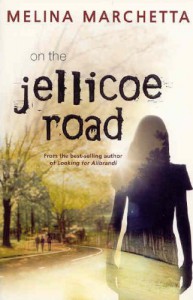 Dear God, this is the most heartbreakingly beautiful and wonderful book in the universe.
Dear God, this is the most heartbreakingly beautiful and wonderful book in the universe. I, uhh, cried. I actually cried.
Here's how it opens:
My father took one hundred and thirty-two minutes to die.
I counted.
It happened on the Jellicoe Road. The prettiest road I'd ever seen, where trees made breezy canopies like a tunnel to Shangri-La. We were going to the ocean, hundreds of miles away, because I wanted to see the ocean and my father said that it was about time the four of us made that journey. I remember asking, "What's the difference between a trip and a journey?" and my father said, "Narnie, my love, when we get there, you'll understand," and that was the last thing he ever said.
And if that doesn't have you running buy it then, frankly, you have no soul. I know it sounds like it's a deeply harrowing tissue-fest but, as much as it's a book about grief and pain, it's also a book about hope and love. Despite this, it's non-mushy on the subject (I'm not a particularly mushy person) - and the heroine, Taylor, has a strong, snarky narrative voice that goes along way to stop the emotion of all it just getting too much.
I'm not going to detail the plot because you can Google it, but it starts with two storylines, one from the past, one from the present, running in parallel. And as the novel progresses, you start to understand just how intricately they're connected.
And, honestly, it's just complicated, and painful, and beautiful. And you should read it.
The Scandal of the Season
 This is a sort of prequel / riff on The Rape of the Lock, told in a sort of breathless, bawdy Georgian/modern style medley. Basically, if you're the sort of person who likes this sort of thing, then this will be the sort of thing that you like. I really enjoyed it.
This is a sort of prequel / riff on The Rape of the Lock, told in a sort of breathless, bawdy Georgian/modern style medley. Basically, if you're the sort of person who likes this sort of thing, then this will be the sort of thing that you like. I really enjoyed it.
Blood of the Zombies (Fighting Fantasy)
 H feels I am letting the side down by not having a review for Blood of Zombies.
H feels I am letting the side down by not having a review for Blood of Zombies.I therefore transcribe H's comments:
"This is a classic Ian Livingston instadeathaganza. At one point, I became so demoralised that I attempted to cheat and still failed. It's one of those books where you basically auto-lose if you don't find the right obscure item at the right time. You also auto-lose if you don't keep track of the number of zombies you killed, and kill enough zombies. Sort of brilliant, in a ludicrous, really old school way."
Enjoy.
Twilight (The Twilight Saga, Book 1)
 Weirdly ... I do not hate Twilight. I had a cold when I first read it, and maybe it was the medication going to my head, but although there are incalculable things wrong with it, from the banality of the writing to the straight down the line stupid of everything, I don't *actually* think it's the worst thing in the world ever. I mean, it did sort of open the door for a sub-genre of YA fiction about girls who are totally conventionally attractive but think they aren't getting to be with hot supernatural dudes who are unheathily obsessed with them.
Weirdly ... I do not hate Twilight. I had a cold when I first read it, and maybe it was the medication going to my head, but although there are incalculable things wrong with it, from the banality of the writing to the straight down the line stupid of everything, I don't *actually* think it's the worst thing in the world ever. I mean, it did sort of open the door for a sub-genre of YA fiction about girls who are totally conventionally attractive but think they aren't getting to be with hot supernatural dudes who are unheathily obsessed with them.The thing is, as a depiction of what you think you want when you're a teenager, it's probably ... fair enough? I've never been a teenage girl, admittedly, but I do remember believing in love like the movies. I'd have totally been up for a hot boy/girl committing their entire life to me, me, me, just me. Right down to watching me sleep and having no respect for my personal choices.
I do think there's value in engaging with these sort of fantasies as fantasies.
As long as you're sensible and self-aware about it.
And there, right there, we come to the problem of Twilight.
I think I've said all I need to say.
Except that I honestly think it gets too much grief.




